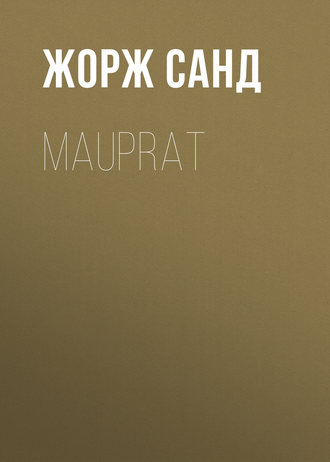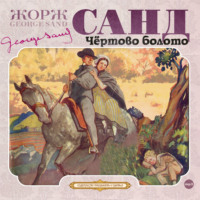 полная версия
полная версияMauprat
And he moved away dreamily, and muttering to himself as was his wont. Marcasse took off his hat to me and said in an impassive tone:
“He is wrong.. live at peace.. pardon.. peace.. farewell!”
They disappeared; and there ended my relations with Patience. I did not come in contact with him again until long afterward.
VI
I was fifteen when my grandfather died. At Roche-Mauprat his death caused no sorrow, but infinite consternation. He was the soul of every vice that reigned therein, and it is certain that he was more cruel, though less vile, than his sons. On his death the sort of glory which his audacity had won for us grew dim. His sons, hitherto held under firm control, became more and more drunken and debauched. Moreover, each day added some new peril to their expeditions.
Except for the few trusty vassals whom we treated well, and who were all devoted to us, we were becoming more and more isolated and resourceless. People had left the neighbouring country in consequence of our violent depredations. The terror that we inspired pushed back daily the bounds of the desert around us. In making our ventures we had to go farther afield, even to the borders of the plain. There we had not the upper hand; and my Uncle Laurence, the boldest of us all, was dangerously wounded in a skirmish. Other schemes had to be devised. John suggested them. One was that we should slip into the fairs under various disguises, and exercise our skill in thieving. From brigands we became pick-pockets, and our detested name sank lower and lower in infamy. We formed a fellowship with the most noisome characters our province concealed, and, by an exchange of rascally services, once again managed to avoid destitution.
I say we, for I was beginning to take a place in this band of cutthroats when my grandfather died. He had yielded to my entreaties and allowed me to join in some of the last expeditions he attempted. I shall make no apologies; but here, gentlemen, you behold a man who has followed the profession of a bandit. I feel no remorse at the recollection, no more than a soldier would feel at having served a campaign under orders from his general. I thought that I was still living in the middle ages. The laws of the land, with all their strength and wisdom, were to me words devoid of meaning. I felt brave and full of vigour; fighting was a joy. Truly, the results of our victories often made me blush; but, as they in no way profited myself, I washed my hands of them. Nay, I remember with pleasure that I helped more than one victim who had been knocked down to get up and escape.
This existence, with its movement, its dangers, and its fatigues, had a numbing effect on me. It took me away from any painful reflections which might have arisen in my mind. Besides, it freed me from the immediate tyranny of John. However, after the death of my grandfather, when our band degraded itself to exploits of a different nature, I fell back under his odious sway. I was by no means fitted for lying and fraud. I displayed not only aversion but also incapacity for this new industry. Consequently my uncle looked upon me as useless, and began to maltreat me again. They would have driven me away had they not been afraid that I might make my peace with society, and become a dangerous enemy to themselves. While they were in doubt as to whether it was wiser to feed me or to live in fear of me, they often thought (as I have since learned) of picking a quarrel with me, and forcing a fight in which I might be got rid of. This was John’s suggestion. Antony, however, who retained more of Tristan’s energy and love of fair play at home than any of his brothers, proved clearly that I did more good than harm. I was, he declared, a brave fighter, and there was no knowing when they might need an extra hand. I might also be shaped into a swindler. I was very young and very ignorant; but John, perhaps, would endeavour to win me over by kindness, and make my lot less wretched. Above all, he might enlighten me as to my true position, by explaining that I was an outcast from society, and could not return to it without being hanged immediately. Then, perhaps, my obstinacy and pride would give way, out of regard to my own well-being on the one hand, and from necessity on the other. At all events, they should try this before getting rid of me.
“For,” said Antony to round off his homily, “we were ten Mauprats last year; our father is dead, and, if we kill Bernard, we shall only be eight.”
This argument gained the day. They brought me forth from the species of dungeon in which I had languished for several months; they gave me new clothes; they exchanged my old gun for a beautiful carbine that I had always coveted; they explained to me my position in the world; they honoured me with the best wine at meals. I promised to reflect, and meanwhile, became rather more brutalized by inaction and drunkenness than I had been by brigandage.
However, my captivity had made such a terrible impression on me that I took a secret oath to dare any dangers that might assail me on the territories of the King of France, rather than endure a repetition of that hideous experience. Nothing but a miserable point of honour now kept me at Roche-Mauprat. It was evident that a storm was gathering over our heads. The peasants were discontented, in spite of all our efforts to attach them to us; doctrines of independence were secretly insinuating themselves into their midst; our most faithful retainers were growing tired of merely having their fill of bread and meat; they were demanding money, and we had none. We had received more than one serious summons to pay our fiscal dues to the state, and as our private creditors had joined hands with the crown officers and the recalcitrant peasants, everything was threatening us with a catastrophe like that which had just overtaken the Seigneur de Pleumartin in our province.1
My uncles had long thought of making common cause with this country squire in his marauding expeditions and his resistance to authority. However, just as Pleumartin, about to fall into the hands of his enemies, had given his word of honour that he would welcome us as friends and allies if we went to his assistance, we had heard of his defeat and tragic end. Thus we ourselves were now on our guard night and day. It was a question of either fleeing the country or bracing ourselves for a decisive struggle. Some counselled the former alternative; the others declared their resolve to follow the advice of their dying father and to find a grave under the ruins of the keep. Any suggestion of flight or compromise they denounced as contemptible cowardice. The fear, then, of incurring such a reproach, and perhaps in some measure an instinctive love of danger, still kept me back. However, my aversion to this odious existence was only lying dormant, ready to break out violently at any moment.
One evening, after a heavy supper, we remained at table, drinking and conversing – God knows in what words and on what subject! It was frightful weather. The rain, driven through the broken windows, was running in streams across the stone floor of the hall; and the old walls were trembling in the storm. The night wind was whistling through chinks in the roof and making the flames of our resin torches flicker weirdly. During the meal my uncles had rallied me very much on what they called my virtue; they had treated my shyness in the presence of women as a sign of continence; and it was especially in this matter that they urged me to evil by ridiculing my modesty. While parrying these coarse gibes and making thrusts in the same strain, I had been drinking enormously. Consequently, my wild imagination had become inflamed, and I boasted that I would be bolder and more successful with the first woman brought to Roche-Mauprat than any of my uncles. The challenge was accepted amid roars of laughter. Peals of thunder sent back an answer to the infernal merriment.
All at once the horn was heard at the portcullis. Everybody stopped talking. The blast just blown was the signal used by the Mauprats to summon each other or make themselves known. It was my Uncle Laurence, who had been absent all day and who was now asking to be let in. We had so little confidence in others that we acted as our own turnkeys in the fortress. John rose and took down the keys, but he stopped immediately on hearing a second blast of the horn. This meant that Laurence was bringing in a prize, and that we were to go and meet him. In the twinkling of an eye all the Mauprats were at the portcullis, torch in hand – except myself, whose indifference at this moment was profound, and whose legs were seriously conscious of wine.
“If it is a woman,” cried Antony as he went out, “I swear by the soul of my father that she shall be handed over to you, my valiant young man, and we’ll see if your courage comes up to your conceit.”
I remained with my elbows on the table, sunk in an uncomfortable stupor.
When the door opened again I saw a woman in a strange costume entering with a confident step. It required an effort to keep my mind from wandering, and to grasp what one of the Mauprats came and whispered to me. In the middle of a wolf-hunt, at which several of the nobles in the neighbourhood had been present with their wives, this young lady’s horse had taken fright and bolted away from the rest of the field. When it had pulled up after a gallop of about a league, she had tried to find her way back; but, not knowing the Varenne district, where all the landmarks are so much alike, she had gone farther and farther astray. The storm and the advent of night had completed her perplexity. Laurence, happening to meet her, had offered to escort her to the chateau of Rochemaure, which, as a fact, was more than six leagues distant; but he had declared that it was quite near, and had pretended to be the gamekeeper there. She did not actually know the lady of Rochemaure, but being a distant connection of hers, she counted upon a welcome. Never having seen the face of a single Mauprat, and little dreaming that she was so near their haunt, she had followed her guide confidingly; and as she had never in her life caught a glimpse of Roche-Mauprat, whether in the distance or close at hand, she was led upon the scene of our orgies without having the least suspicion of the trap into which she had fallen.
When I rubbed my heavy eyes and beheld this woman, so young and so beautiful, with her expression of calm sincerity and of goodness, the like of which I had never seen on the brow of any other (for all those who had passed the portcullis of our abode were either insolent prostitutes or stupid victims), I could not but think I was dreaming.
Remembering how prominently fairies figured in my legends of chivalry, I almost fancied that Morgana or Urganda had come among us to administer justice; and, for the moment, I felt an inclination to throw myself on my knees and protest against any judgment which should confound me with my uncles. Antony, to whom Laurence had quickly given the cue, approached her with as much politeness as he had in his composition, and begged her to excuse his hunting costume, likewise that of his friends. They were all nephews or cousins of the lady of Rochemaure, whom they were now awaiting before sitting down to table. Being very religious, she was at present in the chapel, in pious conference with the chaplain. The air of simple confidence with which the stranger listened to these absurd lies went to my heart, but I had not a very clear idea of what I felt.
“Please,” she said to my Uncle John, who was dancing attendance on her with the leer of a satyr, “please do not let me disturb this lady. I am so troubled about the anxiety I must be causing my father and my friends at the present moment, that I could not really stop here. All I ask is that she will be kind enough to lend me a fresh horse and a guide, so that I may return to the place where I presume my people may have gone to wait for me.”
“Madame,” replied John, with assurance, “it is impossible for you to start again in such weather as this; besides, if you did, that would only serve to delay the hour of rejoining those who are looking for you. Ten of our men, well mounted and provided with torches, shall set out this very moment in ten different directions and scour every corner of Varenne. Thus, in two hours at the most, your relatives will be certain to have news of you, and you will soon see them arriving here, where we will entertain them as best we can. Please, then, set your mind at rest, and take some cordial to restore you; for you must be wet through and quite exhausted.”
“Were it not for the anxiety I feel,” she answered with a smile, “I should be famished. I will try to eat something; but do not put yourselves to any inconvenience on my account. You have been far too good already.”
Approaching the table, where I was still resting on my elbows, she took some fruit that was by my side without noticing me. I turned and stared at her insolently with a besotted expression. She returned my gaze haughtily – at least, so it appeared to me then. I have since learned that she did not even see me; for, while making a great effort to appear calm and to reply with an air of confidence to the offers of hospitality, she was at heart very much disturbed by the unexpected presence of so many strange men with their forbidding mien and rough garb. However, she did not suspect anything. I overheard one of the Mauprats near me saying to John:
“Good! It’s all right; she is falling into the trap. Let us make her drink; then she will begin to talk.”
“One moment,” replied John; “watch her carefully; this is a serious matter; there is something better to be had out of this than a little passing pleasure. I am going to talk it over with the others; you will be sent for to give your opinion. Meanwhile keep an eye on Bernard.”
“What is the matter?” I said abruptly, as I faced him. “Does not this girl belong to me? Did not Antony swear it by the soul of my grandfather?”
“Yes, confound it, that’s true,” said Antony, approaching our group, whilst the other Mauprats surrounded the lady. “Listen, Bernard; I will keep my word on one condition.”
“What is that?”
“It is quite simple: that you won’t within the next ten minutes tell this wench that she is not at old Rochemaure’s.”
“What do you take me for?” I answered, pulling my hat over my eyes. “Do you think that I am an idiot? Wait a minute; would you like me to go and get my grandmother’s dress which is upstairs and pass myself off for this same lady of Rochemaure?”
“A splendid idea!” replied Laurence.
“But before anything is done,” said John, “I want to speak to you all.”
And making signs to the others, he drew them out of the hall. Just as they were going out I thought I noticed that John was trying to persuade Antony to keep watch over me. But Antony, with a firmness which I could not understand, insisted on following the rest. I was left alone with the stranger.
For a moment I remained bewildered, almost stupefied, and more embarrassed than pleased at the tete-a-tete. Then I endeavoured to think of some explanation of these mysterious things that were happening around me, and succeeded, as far as the fumes of the wine would allow me, in imagining something fairly probable, though, indeed, remote enough from the actual truth.
I thought I could account for everything I had just seen and heard by supposing, first, that the lady, quiet and richly dressed though she was, was one of those daughters of Bohemia that I had sometimes seen at fairs; secondly, that Laurence, having met her in the country, had brought her here to amuse the company; and, thirdly, that they had told her of my condition of swaggering drunkenness, and had prevailed on her to put my gallantry to the proof, whilst they were to watch me through the keyhole. My first movement, as soon as these ideas had taken possession of me, was to rise and go straight to the door. This I locked with a double turn and then bolted. When I had done this I returned to the lady, determined that I would not, at all events, give her cause to laugh at my bashfulness.
She was sitting close to the fire, and as she was occupied in drying her wet garments, leaning forward over the hearth, she had not taken any notice of what I was doing; but when I approached her the strange expression on my face caused her to start. I had made up my mind to kiss her, as a beginning; but, I know not by what miracle, as soon as she raised her eyes to mine, this familiarity became impossible. I only had sufficient courage to say:
“Upon my word, mademoiselle, you are a charming creature, and I love you – as true as my name is Bernard Mauprat.”
“Bernard Mauprat!” she cried, springing up; “you are Bernard Mauprat, you? In that case, change your manner and learn to whom you are talking. Have they not told you?”
“No one has told me, but I can guess,” I replied with a grin, while trying hard to trample down the feeling of respect with which her sudden pallor and imperious attitude inspired me.
“If you can guess,” she said, “how is it possible that you allow yourself to speak to me in this way? But they were right when they said you were ill-mannered; and yet I always had a wish to meet you.”
“Really!” I said, with the same hideous grin. “You! A princess of the king’s highway, who have known so many men in your life? But let my lips meet your own, my sweet, and you shall see if I am not as nicely mannered as those uncles of mine whom you were listening to so willingly just now.”
“Your uncles!” she cried, suddenly seizing her chair and placing it between us as if from some instinct of self-defence. “Oh, mon Dieu! mon Dieu! Then I am not at Madame de Rochemaure’s?”
“Our name certainly begins in the same way, and we come of as good a rock as anybody.”
“Roche-Mauprat!” she muttered, trembling from head to foot, like a hind when it hears the howl of wolves.
And her lips grew quite white. Her agony was manifest in every gesture. From an involuntary feeling of sympathy I shuddered myself, and I was on the point of changing my manner and language forthwith.
“What can there be in this to astound her so?” I asked myself. “Is she not merely acting a part? And even if the Mauprats are not hidden behind some wainscot listening to us, is she not sure to give them an account of everything that takes place? And yet she is trembling like an aspen leaf. But what if she is acting? I once saw an actress play Genevieve de Brabant, and she wept so that one might have been deceived.”
I was in a state of great perplexity, and I cast harassed glances now at her, now at the doors, which I fancied every moment would be thrown wide open amid roars of laughter from my uncles.
This woman was beautiful as the day. I do not believe there has ever lived a woman as lovely as she. It is not I alone who say so; she has left a reputation for beauty which has not yet died out in her province. She was rather tall, slender, and remarkable for the easy grace of her movements. Her complexion was very fair, while her eyes were dark and her hair like ebony. Her glance and her smile showed a union of goodness and acuteness which it was almost impossible to conceive; it was as if Heaven had given her two souls, one wholly of intellect, the other wholly of feeling. She was naturally cheerful and brave – an angel, indeed, whom the sorrows of humanity had not yet dared to touch. She knew not what it was to suffer; she knew not what it was to distrust and dread. This, indeed, was the first trial of her life, and it was I, brute that I was, who made her undergo it. I took her for a gipsy, and she was an angel of purity.
She was my young cousin (or aunt, after the Breton fashion), Edmee de Mauprat, the daughter of M. Hubert, my great-uncle (again in the Breton fashion), known as the Chevalier – he who had sought release from the Order of Malta that he might marry, though already somewhat advanced in years. My cousin was the same age as myself; at least, there was a difference of only a few months between us. Both of us were now seventeen, and this was our first interview. She whom I ought to have protected at the peril of my life against the world was now standing before me trembling and terror-stricken, like a victim before the executioner.
She made a great effort, and approaching me as I walked about the hall deep in thought, she explained who she was, adding:
“It is impossible that you can be an infamous creature like all these brigands whom I have just seen, and of whose hideous life I have often heard. You are young; your mother was good and wise. My father wanted to adopt you and bring you up as his son. Even to-day he is still full of grief at not being able to draw you out of the abyss in which you lie. Have you not often received messages from him? Bernard, you and I are of the same family; think of the ties of blood; why would you insult me? Do they intend to assassinate me here or torture me? Why did they deceive me by saying that I was at Rochemaure? Why did they withdraw in this mysterious way? What are they preparing? What is going to happen?”
Her words were cut short by the report of a gun outside. A shot from the culverin replied to it, and the alarm trumpet shook the gloomy walls of the keep with its dismal note. Mademoiselle de Mauprat fell back into her chair. I remained where I was, wondering whether this was some new scene in the comedy they were enjoying at my expense. However, I resolved not to let the alarm cause me any uneasiness until I had certain proof that it was not a trick.
“Come, now,” I said, going up to her again, “own that all this is a joke. You are not Mademoiselle de Mauprat at all; and you merely want to discover if I am an apprentice capable of making love.”
“I swear by Christ,” she answered, taking my hands in her own, which were cold as death, “that I am Edmee, your cousin, your prisoner – yes, and your friend; for I have always felt an interest in you; I have always implored my father not to cease his efforts for you. But listen, Bernard; they are fighting, and fighting with guns! It must be my father who has come to look for me, and they are going to kill him. Ah!” she cried, falling on her knees before me, “go and prevent that, Bernard! Tell your uncles to respect my father, the best of men, if you but knew! Tell them that, if they hate our family, if they must have blood, they may kill me! Let them tear my heart out; but let them respect my father.”
Some one outside called me in a violent voice.
“Where is the coward? Where is that wretched boy?” shouted my Uncle Laurence.
Then he shook the door; but I had fastened it so securely that it resisted all his furious blows.
“That miserable cur is amusing himself by making love while our throats are being cut! Bernard, the mounted police are attacking us! Your Uncle Louis had just been killed! Come and help us! For God’s sake, come, Bernard!”
“May the devil take the lot of you,” I cried, “and may you be killed yourself, if I believe a single word of all this. I am not such a fool as you imagine; the only cowards here are those who lie. Didn’t I swear that the woman should be mine? I’m not going to give her up until I choose.”
“To hell with you!” replied Laurence; “you are pretending.”
The shots rang out faster. Frightful cries were heard. Laurence left the door and ran in the direction of the noise. His eagerness proved him so much in earnest that I could no longer refuse to believe him. The thought that they would accuse me of cowardice overcame me. I advanced towards the door.
“O Bernard! O Monsieur de Mauprat!” cried Edmee, staggering after me; “let me go with you. I will throw myself at your uncles’ feet; I will make them stop the fight; I will give them all I possess, my life, if they wish.. if only they will spare my father.”
“Wait a moment,” I said, turning towards her; “I am by no means certain that this is not a joke at my expense. I have a suspicion that my uncles are there, behind that door, and that, while our whippers-in are firing off guns in the courtyard, they are waiting with a blanket to toss me. Now, either you are my cousin, or you are a.. You must make me a solemn promise, and I will make you one in return. If you are one of these wandering charmers and I quit this room the dupe of your pretty acting, you must swear to be my mistress, and to allow none other near you until I have had my rights; otherwise, for my part, I swear that you shall be chastised, even as my spotted dog Flora was chastised this morning. If, on the other hand, you are Edmee, and I swear to intervene between your father and those who would kill him, what promise will you make me, what will you swear?”









